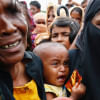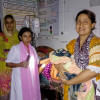Women and newborns: The heart of midwifery
Midwives have helped women deliver babies since the beginning of history. We can find references to midwives in Arabic, Greek, Hindu and Islamic texts.
They are privileged to bear witness to moments of intense joy, to some of great sadness, and sometimes death. This is the journey of the midwife. Even with advances in technology and too high c- section rates, deaths occur in the reproductive years because women--usually the poor and the marginalised -- have no access, or too late access to qualified health professionals. Today we are helping to change this reality for Bangladesh. On this International day of the Midwife 2016, we celebrate the registration of 597 Bangladeshi Diploma Midwives.
In Dec 2015, 179 midwives recruited specifically from high needs underserved areas graduated from the UK Aid funded BRACU administered Developing Midwives Project (DMP). What was different about this Diploma level course was that it focused specifically on delivering the full range of midwifery services at the community level. Global models of midwifery support a midwife at every level of service delivery to ensure the continuum of care from home to hospital.
The BDHS survey 2014 and other data sources show us that although progresshas been made, many women still prefer to deliver at home for a multitude of reasons. Midwifery, whether in a supportive community or in a facility plays a large role in a family's life and midwives function as clinicians, trainers, patient counselors, public health care providers, and advocates. In line with this, the BRACU DMP believes in a vision of "A quality midwife for every community". In its recruitment of midwives from 169 upazilas BRACU DMP is bringing us daily closer to the reality of Midwives everywhere in Bangladesh. New history is being made as women now have access to fully trained Diploma level midwives to care for them within their communities.
An elder midwife once told me that endurance is about knowing yourself well enough to find ways around you, and resisting the temptation to give up. Midwives have a history of resisting the status quo for positive change, such as the midwives who did not allow pharaoh to kill all of the newborn males in ancient Egypt. Throughout history resistance movements have changed the course of events in insurmountable odds. As we celebrate this moment and look to the future of Midwifery in Bangladesh, we encourage every midwife to keep resisting overly technological and medicalised birth, violence against women and children and women's disempowerment. They need to resist the voices that say your dreams are impossible. Midwives, go forth and change the world!
The writer is Clinical Director Midwifery Education-BRACU/DFID Developing Midwives Project.

 For all latest news, follow The Daily Star's Google News channel.
For all latest news, follow The Daily Star's Google News channel. 






Comments